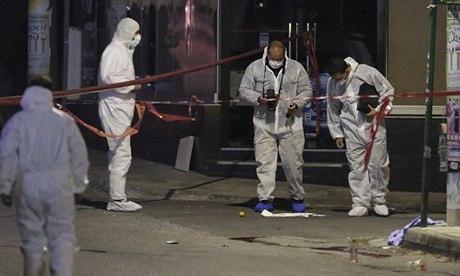Helena Smith in Athens theguardian.com, Saturday 2 November 2013
Third member of far-right Greek party severely injured in what police call 'terrorist attack'
Police forensic experts search for evidence outside offices of the Golden Dawn party in Athens, following a shooting that killed two. Photograph: John Kolesidis/Reuters
Crisis-plagued Greece was thrown into further turmoil on Friday after two members of the far-right Golden Dawn party were shot dead in what police called a "terrorist attack" outside one of the organisation's offices in Athens.
Two men, described as a 20 and 23-year-old, died instantly in the drive-by shooting, according to a statement released by the extremist group.
"Two helmeted terrorists on a motorbike stopped in front of Golden Dawn's offices in [the northern Athens suburb of] Neo Iraklio while the office was open and a lot of people were [gathered around] its entrance," said the party.
"The co-rider got off [the bike] and in cold blood executed two young men at a distance of about half a metre. Before leaving the terrorists fired again … they literally emptied their weapons [of bullets] on top of them."
A third Golden Dawn member, identified as a 29-year-old father of one, was fighting for his life in an Athens hospital after being severely injured in the hail of gunfire.
"His situation is very critical," the country's health minister Adonis Georgiadis told Skai TV.
Police said the attack, conducted with an MB5 machine gun, bore all the hallmarks of a well-organised terrorist operation although government officials insisted they were not ruling out any scenario.
Greece's public order minister Nikos Dendias issued a carefully-worded statement shortly after 8.30pm local time, approximately one hour after the attack. "I express my sorrow at the death of two young men," he said. "The law will prevail. The country will not be allowed to become a battle field for the settling of scores."
The attack comes almost two months after a leftwing hip-hop artist, Pavlos Fyssas, was fatally stabbed by a self-confessed member of Golden Dawn in a working class area of Athens. The murder set in motion a crackdown on the neo-Nazi party that has since seen its leader, Nikos Michaloliakos, and several of his leading cadres imprisoned on charges of using the virulently anti-immigrant organisation to operate a
a criminal gang that sowed wanton terror on the streets of Greece.
In an explosive political atmosphere already poisoned by the despair wrought by cuts demanded in return for rescue funds to prop up the country's debt-stricken economy, the crackdown has heightened tensions.
"Some are preparing to lead this country to civil war," said Panos Kammenos, leader of the rightwing Independent Greeks party, reacting to the killings. "Clearly there are those who want to destabilise this country politically," he added suggesting that "foreign centres" were among the dark forces working against Greece.
The cold-blooded murders were quick to send a chill through Athens' entire political establishment. Insiders said it had sent tremors through the fragile coalition government with many describing the mood in Prime Minister Antonis Samaras' office as being "numb" with shock.
"The murderers, whoever they are, will be treated mercilessly," said Simos Kedigoglou, a government spokesman, emerging from a crisis meeting called by Samaras.
Across the board there were fears of the backlash the murders could unleash.
"It's a very dangerous development that could lead to a vicious cycle of blood being shed in a country that is already being torn apart," said Andreas Papadopoulos, spokesman of the small Democratic Left party, which withdrew from the tripartite government in disgust over its economic policies in the summer.
Analysts worried on Friday that Golden Dawn, which has accused the political establishment of waging a war to destroy it, will use the tragedy to once again boost its ratings in the polls. "My fear is that Golden Dawn will exploit this to make the point that it too is being persecuted, that it's own members are being cold-bloodedly murdered," said the political commentator Dimitris Tsiodras.
Catapulted into parliament for the first time in June 2012, the neo-fascist party remains the country's third biggest political force, although its support has plummeted since the 18 September murder of Fyssas. Last week, the Greek parliament voted to cut off funding for the party as the campaign intensified to marginalise it.
![The [Greek] European Tragedy](https://blogger.googleusercontent.com/img/b/R29vZ2xl/AVvXsEiWKI5s90SFm1wWTk6bs4p7CgslaC2SnYPsrZhb-B-smOufNNCSxCvpBLI9hOB-LsXZjir_PNmEiMk2-E62F3xkg96IoC6QFAaZAnPRTVH340IN9WBRmWJqPkjWlgyRj3zpALp7h6hvA58/s920/GkBack_new.jpg)
